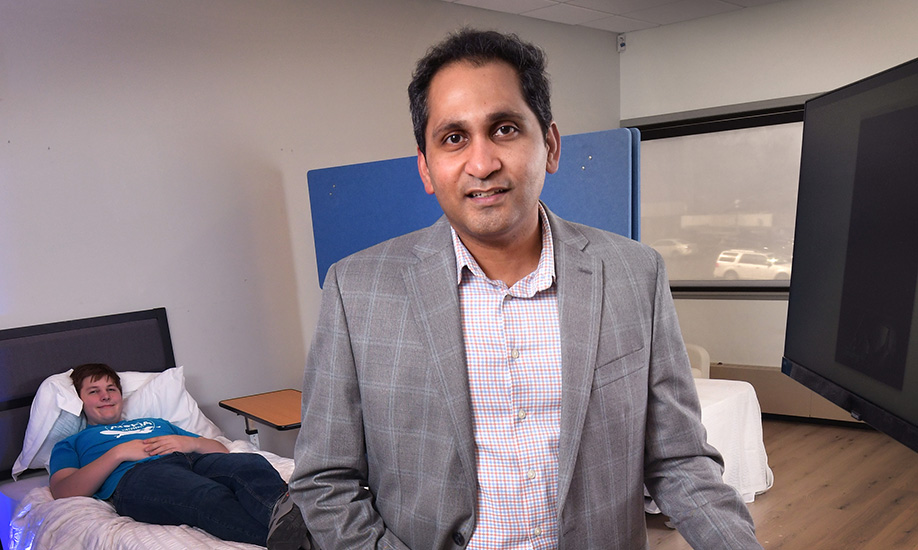The Peoria-based AI company VirtuSense is being recognized as a global innovation leader, specifically in the prevention of falls
Ten years ago, engineer Deepak Gaddipati founded VirtuSense Technologies to solve a complex and deeply personal problem. How do you proactively identify risk factors for adults to prevent falls?
Gaddipati’s grandmother had been an active 68-year-old when she fell and broke her hip in 2009. It was her first fall, but she passed away from complications within 10 days. The whole family was in shock.
A graduate of Bradley University’s engineering master’s degree program, Gaddipati, 41, was already known for finding solutions. He invented the full-body scanner now used in many airports and had been working on government defense contracts.
He started talking to doctors, nurses and physical therapists to identify what put a person at risk of falling. His six-person team poured over peer-reviewed medical data, pinpointing balance, logic, cognitive function, endurance and flexibility as the key factors involved in a fall. Then, they plugged thousands of hours of data into machines to train them how to detect and monitor those factors.
Today, VirtuSense employs more than 130 people, 55 of those at its Peoria headquarters, and helps care for 1.4 million seniors across hospital systems, post-acute care facilities and doctor’s offices. The company’s VSTAlert, VSTBalance and VSTOne systems have prevented an estimated 106,000 falls and 22,000 hospital admissions in the last two and a half years alone.
“These are real people. I mean my parents, your parents, grandparents,” said Gaddipati. “We don’t publish all the data. Our clients do. They say, ‘We got a 90% reduction in falls.’ Everyone wants to show they’re using this and seeing tremendous changes. That’s what gets us going, and that’s how we’ve been growing pretty aggressively.”
‘Everyone wants to show they’re using this and seeing tremendous changes. That’s what
gets us going’— Deepak Gaddipati
At one point, the company branched out to work with NBA and NFL teams on injury prevention. Three years ago, VirtuSense stopped selling that equipment to new clients or offering support for existing machines. Professional teams still request devices because they’ve seen significant benefits to players, said Gaddipati. But rather than support these glamorous businesses, VirtuSense has focused on essential health care issues highlighted by the pandemic.
“Our customers saw us as a very innovative company that can make anything happen,” said Gaddipati. “I can’t tell you how many calls we fielded asking, ‘Can you automatically measure vitals? Can you enable telehealth for me?’ So, during a pandemic, in the midst of everyone sitting at home, we executed our telehealth solution, which is becoming the basis for telehealth and virtual nursing. Now also for acute care.
“We have variables that go on the chest that automatically measure vitals. I’m not kidding. Within a matter of a few months, we got this up and running by partnering with companies and some of these post-acute communities. We didn’t even charge them. We just gave away these products because they said they couldn’t care for these patients.”
A 2010 study published in The Journal of Healthcare Information Management found that automating the collection of patient vitals like pulse and respiration rate reduces errors by 75%. It can also save almost 120 hours of staff time per month. VirtuSense systems boast 98% accuracy with fewer false alarms, alleviating alarm fatigue for staff. At a time when the health care industry faces staffing shortages and high burnout, these time-savers mean better care for patients and less stress for workers.
Gaddipati is very frank about his goals for the company. His previous work at the Department of Defense and the Transportation Security Administration showed him technology years ahead of anything consumers could purchase. He saw that health care services lagged behind consumer products by up to five years.
“What we do today on technology is leapfrogging health care like five or six years ahead of COVID,” he said. “That’s what gives us the ability to have this one-device strategy in the hospital room. That [technology] is your eyes, ears, mouth and brain. That all is in the room itself. It’s privacy-centric. It’s simple. It’s not expensive to install.”
VirtuSense is leaping forward so emphatically that it was named one of Fast Company’s 50 Most Innovative Companies for 2022. It’s a multi-year winner of McKnight’s technology awards, including the 2021 Silver winner for Innovator of the Year.
VirtuSense systems boast 98% accuracy with fewer false alarms, alleviating alarm fatigue for staff
The company’s continued pursuit of technological excellence led its leaders to organize the inaugural New Evolution in Healthcare Technology (NEXT) Summit in Peoria in 2022. The invite-only conference drew some 70 executives from the top names in health care to discuss trends, staffing issues and how innovation can make care more efficient and affordable. Among them were Danika Fry, Morgan Stanley’s executive director for health care investment banking; Seema Verma, former administrator at the Centers for Medicare & Medicaid Services; and Dr. Michael Cruz, CEO of the Central Region of OSF HealthCare.
Gadipatti said he has found Peoria an excellent place to develop business opportunities and relationships. VirtuSense works closely with OSF Saint Francis Medical Center, UnityPoint Health-Methodist Hospital and the Jump Trading Simulation & Education Center. The company also works with Hospital Sisters Health Systems and Carle Health in Springfield. Its post-acute care currently has a wide reach in major cities including Chicago.
A native of India and former resident of New York and Los Angeles, Gaddipati knows that Midwesterners are a special breed.
“The best thing [about Peoria] is people are very helpful. They’re not arrogant. They see value, and they try to help you. It’s not just lip service,” said Gaddipati. “Most of these people are like, ‘Give me a problem. I’m going to solve the problem.’ That’s the mindset that we need.”





